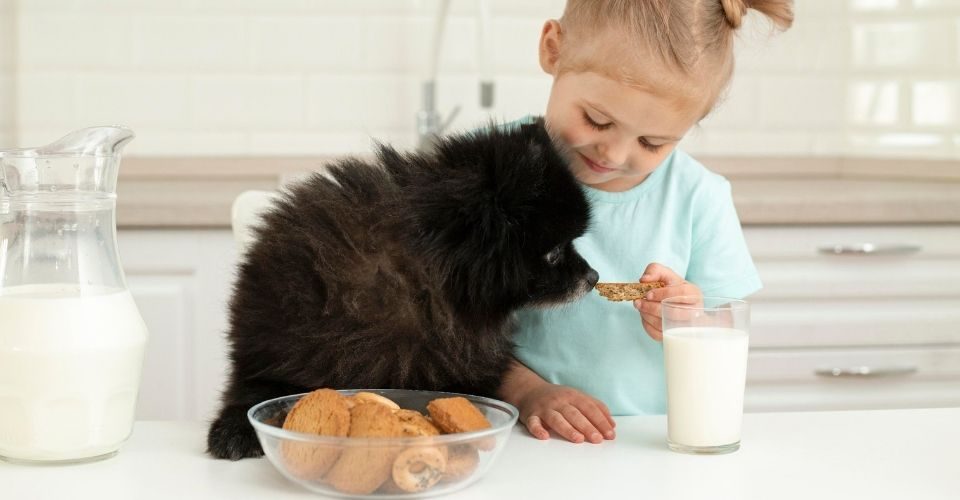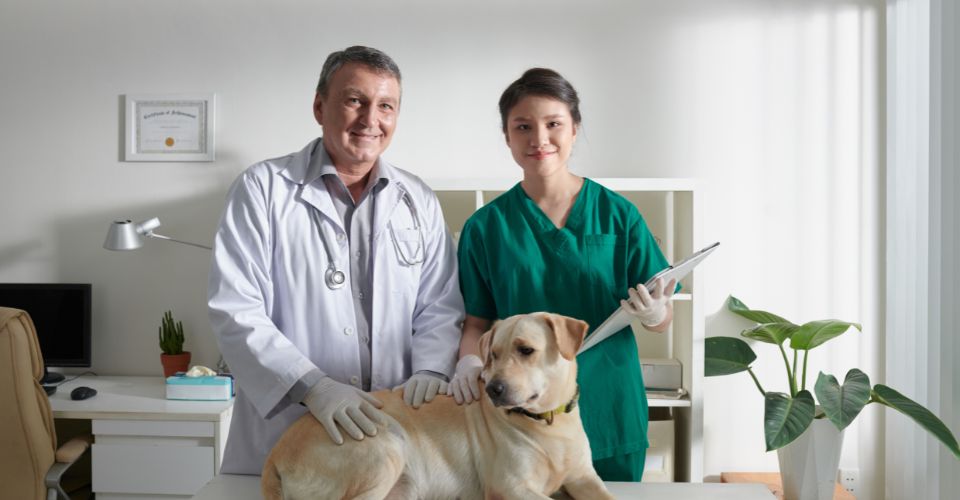Milk and other dairy products can have countless health benefits for both humans and animals. These products are rich in calcium, vitamin B12, phosphorus, and vitamin D which help keep bones and muscle firm and strong. But the question is: Can dogs have milk? Or, can puppies have milk for a healthy gut?
Can Dogs Have Milk?
A quick answer to this question is: Yes, dogs can have milk—but not without some conditions.
A small amount of milk can be of no harm. But if dogs are given more milk than needed over a prolonged time, they can face several health issues. Moreover, it is important to note that some dogs are lactose intolerant, and drinking milk can cause intestinal problems to them.
How Much Milk Can Dogs Have?
Dogs love milk for its rich fat content. Puppies get essential nutrients like antibodies, electrolytes, and vitamins from their mother’s milk. However, once these puppies grow into adults, they no longer consume milk. Dogs do need milk but in small quantities at a later stage. That is, it is no longer an essential and vital part of a dog’s diet. A small amount of milk can do wonders, however. A few tablespoons of cow’s milk can be beneficial for health without displaying any signs of overindulgence. \
But one needs to think twice before offering a dog an entire bowl of milk. An entire bowl in one sitting may produce unpleasant reactions including loose stools, diarrhea, and intestinal issues. Milk and other dairy products themselves are high in fats and natural sugars which can lead to obesity and some serious health conditions in dogs.
Safe Dairy Products Dogs Can Consume
Cheese – Processing milk into cheese decreases the quantity of lactose in it and can produce a different result when given. Cheese like Muenster has a significantly low concentration of lactose, around 1% or less, and is particularly good for lactose intolerant dogs.
Butter – The lactose material of butter is incredibly low i.e. around 0.8% to 0.1%. But as butter is high in salt and fat content. This is why vets regular intake of butter is not for dogs.
Cow’s milk – The lactose milk contains about 5% lactose in it and it can become extremely hard for young puppies to digest. Therefore, vets recommend only a few tablespoons and never a full bowl.
Yogurt – Converting milk into yogurt features an enzyme that helps in the breakdown of lactose. For this particular reason, yogurt is often given in more quantity than milk.
Goat milk – In comparison to cow’s milk, goat’s milk is rich in nutrients like potassium and calcium and also has a slightly lower amount of lactose. Goat’s milk also has a difference in protein structure and its fats which makes it easier for dogs to digest it.
Are Dogs Lactose Intolerant?
“Dogs have varying degrees of lactose intolerance, so some dogs who drink milk may just experience mild GI distress, or none at all, while others will have severe clinical signs,” writes Brausa. Many dogs are lactose intolerant to some degree and can face slight difficulty in digesting dairy products. This condition develops in dogs that do not produce enough of the enzyme called lactase.
Lactase is an enzyme that is essential to breaking down lactose present in all milk, yogurt, and cheese. Dogs that lack these enzymes display an ability to digest dairy products and experience side effects like loose stools bloating, or abdominal pain. Many people have the same problem and opt for lactose-free milk as an alternative.
Likewise, Dogs that do not handle lactose well can try safe human foods like frozen peanut butter. A puppy can also be given a natural digestive supplement like pumpkin as an alternate treat.
Symptoms of lactose intolerance in dogs
After being exposed to dairy products, dogs may experience the following symptoms of lactose intolerance:
- Loose stoles
- Bloating
- Vomiting
- Diarrhea
- Constant gas
Causes of Lactose Intolerance in Dogs
Lactose intolerance in dogs is caused by two major reasons. Firstly, it is caused by the deficiency of lactase. Feeding your dog lactose can cause diarrhea, and other signs because the lactose in the dairy isn’t digested properly due to a lack of lactase in the animal body. Secondly, the ability of dogs to tolerate dairy products depends upon their ability to tolerate proteins in the milk. The dog’s inability to tolerate proteins in the milk is more serious, making them unable to digest dairy products.
Treatment for Lactose Intolerance in Dogs
Treating lactose intolerance in the dog requires the removal of all forms of dairy products from the diet. But there are options for a dog parent to find similar dairy-related products. Lactose-free milk, soy milk products, and almond milk products are some of the effective alternatives available. Moreover, one should also ensure that there are no added sweeteners or flavorings included in the product. Artificial sweeteners or flavorings like raisins, cocoa, and xylitol can be deadly for the pet and needs to be avoided.
Milk for Dog’s Constipation
If you notice that your dog has not been able to produce stool for more than 24 hours, it is a clear indication that your dog is experiencing constipation. Some common symptoms to be aware of may include lack of appetite, hunched posture, hard, dry, and small stools, and a tense abdomen.
Because dogs are lactose intolerant, many claim that milk is a good at-home treatment for dogs. A small amount of milk of magnesia or yogurt can relieve constipation in dogs. However, if a dog is provided more than the required amount, the opposite results will be produced. One needs to consult the vet before giving any such dose.
The Bottom Line of When Can Dogs Have Milk?
Can dogs have milk? Yes. Should you give your dog milk? Yes, you can safely give your dog the right amount while also maintaining its health. But you need to avoid giving your dog milk if it has developed lactose intolerance. If you plan to give your dog any dairy product, always do that in moderation and keep looking out for symptoms.
Also, consult your vet before introducing any new food into the diet of your dog. The bottom line is that moderation is the key. A large amount of dairy products is never a good idea. Also if you plan to switch from cow’s milk to goat’s milk, try giving it in a few quantities at the beginning. Notice the results. If you suspect a change in behavior, stop the feed and consult your vet.
Can dogs have milk? Now you know.
Want to know more about what your dog and can eat and what not? Read more here in our Dog Care and Feeding section.





